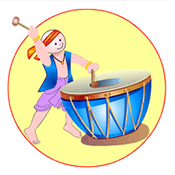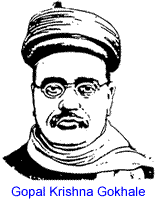
Dimdima
Online Children's Magazine from India

Dimdima
Online Children's Magazine from India
| The Battle is Taken to the Legislature! |
|
|
Gopal Krishna Gokhale who took over as the 'Leader of the Opposition' when Mehta
decided not to contest in 1902, became famous for his incisive budget speeches.
1902, became famous for his incisive budget speeches.
In 1902, reacting to the surplus budget presented by Edward Law, Gokhale held
that the surplus shown in times of famine and suffering constituted 'a wrong to
the community'. Quoting at length from the government's own facts and figures,
Gokhale showed how Indian interests were subordinated to foreign interests and
linked poverty of the people to British rule. Overnight the humble teacher from
Pune who was only 36 years at that time, became the darling of the nation. The
Amrita Bazar Patrika wrote: "We had ever entertained the ambition of seeing some
Indian member openly and fearlessly criticizing the Financial Statement of the
Government. But this ambition was never satisfied. When members had ability,
they had not the requisite courage. When they had the requisite courage, they
had not the ability. For the first time in the annals of British Rule in India,
a native of India has not only succeeded in exposing the fallacies which
underlie these government statements, but has ventured to do it in an
uncompromising manner."
The government feared Gokhale's criticism so much that when a new revenue member
had to be appointed in 1910, Viceroy Minto insisted that the person appointed
should be one who could stand up to Gokhale.
Paying handsome compliments to Gokhale, Lord Curzon observed:
"In fact he was the Leader of the Opposition and in that capacity I had often to
suffer from the weight of Mr. Gokhale's blows... I have never met a man of any
nationality more gifted with Parliamentary capacities. Mr. Gokhale would have
obtained a position of distinction in any Parliament in the world, even in the
British House of Commons. Widely as we differed, I never failed to recognize
either his ability or character."
Other eminent Indian members of councils included Surendranath Banerji, Kali
Charan Banerji, Anand Mohan Bose, W.C. Banerji and others from Bengal; Diwan
Ananda Charlu, C. Sankaran Nair and Vijayaraghavachariar from the South; Madan
Mohan Malaviya, Ayodhyanath and Bishambhar Nath from the United Provinces, and
Tilak, R.M. Sayani, Chimanlal Setalvad, N.G. Chandravarkar and others from
Maharashtra.
These outstanding parliamentarians proved beyond doubt that Indians had the
ability to shoulder the responsibility of conducting their own affairs.
Dimdima is the Sanskrit word for ‘drumbeat’. In olden days, victory in battle was heralded by the beat of drums or any important news to be conveyed to the people used to be accompanied with drumbeats.
Bharatiya Vidya Bhavan
K. M Munshi Marg,
Chowpatty, Mumbai - 400 007
email : editor@dimdima.com
Bharatiya Vidya Bhavan
505, Sane Guruji Marg,
Tardeo, Mumbai - 400 034
email : promo@dimdima.com
Dimdima.com, the Children's Website of Bharatiya Vidya Bhavan launched in 2000 and came out with a Printed version of Dimdima Magazine in 2004. At present the Printed Version have more than 35,000 subscribers from India and Abroad.